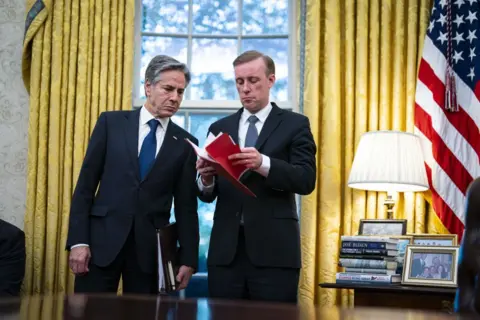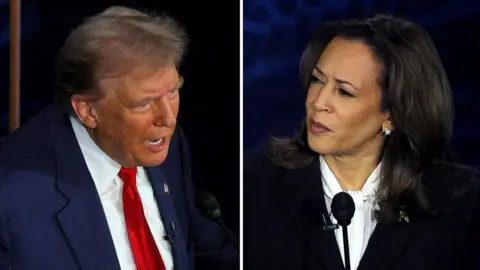The Unprecedented Move: Trump Revokes Security Clearances Of Biden, Harris, Clinton, And Other Political Foes
The Unprecedented Scope: Who Was Targeted and How?
The memo, issued late on a Friday night, directed federal agencies to immediately rescind security clearances and access to classified information for more than a dozen individuals. While the full list was extensive, the names that immediately captured headlines were those of President Trump's most prominent political adversaries. Among the most notable figures whose clearances were revoked were: * **Joe Biden:** The former President, a frequent target of Trump's criticism. * **Kamala Harris:** The former Vice President, also a Democratic rival. * **Hillary Clinton:** Former Secretary of State and Trump's opponent in the 2016 presidential election. * **Liz Cheney:** A Republican Congresswoman who became a vocal critic of Trump. Beyond these high-profile names, the list reportedly included a "string of top Democrats and political foes," encompassing individuals who had either served in high-ranking positions in previous administrations or had been outspoken critics of the Trump presidency. President Trump himself stated that he had revoked the security clearances of "more than a dozen political adversaries." The language used in various reports consistently highlighted the retaliatory nature of the act, referring to those affected as "perceived political opponents," "political foes," and individuals who had "severely criticized" him. The mechanism for this revocation was a presidential memo, a direct order from the Commander-in-Chief to relevant federal agencies. This demonstrated the unilateral power of the presidency in matters of national security access, albeit a power rarely, if ever, used in such a broad and politically charged manner against former high-ranking officials.Understanding Security Clearances: Why Do Former Officials Retain Them?
To fully grasp the significance of Trump's action, it's crucial to understand why former presidents, vice presidents, secretaries of state, and other high-ranking officials typically retain their security clearances after leaving office. This practice is not a legal entitlement but rather a long-standing courtesy and a practical necessity. The primary reasons for maintaining these clearances include: * **Consultation and Advice:** Former officials often possess invaluable institutional knowledge, historical context, and deep expertise on complex national security issues. Current administrations frequently consult them for advice, particularly during crises or transitions. Access to classified information ensures they can provide informed counsel. * **Continuity of Government:** In times of national emergency or transition, having a pool of experienced individuals who can be quickly brought back into service, or simply offer insights without needing to be re-briefed from scratch, is considered a vital asset for national security. * **Foreign Relations:** Former leaders often engage in diplomatic efforts, either officially or unofficially, and their ability to speak with knowledge of classified matters can be beneficial for U.S. foreign policy. * **Historical Record and Memoirs:** While not the primary reason, access to certain classified information can be important for former officials as they document their time in office, contributing to the historical record. It's important to note that retaining a security clearance does not mean unrestricted access to all classified information. It typically involves a "read-in" process for specific programs or intelligence, and the access is granted on a "need-to-know" basis, even for former officials. However, the courtesy of maintaining the clearance itself allows for that potential access when required. Trump's revocation shattered this long-standing tradition, signaling a departure from established norms of political transition and cooperation.The Political Undercurrents: A Retaliatory Act?
The timing and targets of Trump's action strongly suggested a politically motivated, retaliatory measure. Many analysts and commentators immediately interpreted it as a direct response to criticism leveled against him by these individuals.A Retaliatory Act?
The individuals stripped of their clearances were almost exclusively those who had been vocal critics of President Trump. Joe Biden and Kamala Harris were his Democratic election rivals. Hillary Clinton had been his opponent in 2016. Liz Cheney, a prominent Republican, had become one of the most outspoken GOP critics of Trump, particularly after the January 6th Capitol riot. The language in the reports – "political foes," "political adversaries," "opponents who either severely criticized" – reinforced this perception. Furthermore, some reports indicated that Trump's decision came after his own access to classified information had been questioned or potentially curtailed. While the exact timeline of his own post-presidency access is complex, the idea that he was reacting to perceived slights against himself was a common theme in the commentary surrounding the revocations. This "tit-for-tat" approach, where presidential power was used to punish political opponents, was seen by many as a dangerous precedent.The Impact on National Security
The immediate question raised by many was the potential impact on national security. While the practical implications of a former president or vice president *not* having immediate access to classified information might seem minimal on a day-to-day basis, the principle was significant. Critics argued that politicizing security clearances could: * **Undermine Trust:** It could erode trust between administrations and former officials, making it harder for future leaders to rely on the expertise of their predecessors. * **Set a Dangerous Precedent:** If security clearances become a weapon to be wielded against political opponents, it could lead to a cycle of retribution, where each new administration revokes the clearances of the previous one's officials. * **Weaken National Security:** In a crisis, the inability to quickly consult with a highly experienced former official who understands the classified context could, theoretically, hinder effective decision-making. Supporters of the move, however, might argue that security clearances are a privilege, not a right, and that if individuals are deemed untrustworthy or are actively working against the current administration's policies, their access should be revoked. They might also contend that the national security apparatus is robust enough not to rely solely on former officials for advice.The Wider List of Targets
The fact that the revocation extended beyond the most obvious political rivals to include a "string of top Democrats" and "more than a dozen" individuals underscored the breadth of the action. It wasn't just about the current election cycle; it was about silencing or discrediting a wider group of critics who had served in various capacities. This broadened the scope of concern, suggesting a systemic effort to punish dissent rather than a targeted response to specific actions.Precedent and Future Implications
The revocation of security clearances for such a large and prominent group of former officials was widely considered unprecedented in modern U.S. history. While presidents have the authority to grant and revoke clearances, using this power as a tool of political retribution against a broad array of former public servants marked a significant departure from established norms. The key question moving forward is whether this action sets a new precedent. Could future administrations, facing intense political polarization, similarly weaponize security clearances against their predecessors or political opponents? If so, it could fundamentally alter the traditional relationship between incoming and outgoing administrations, replacing cooperation with overt hostility. Such a cycle of retribution could have long-term negative consequences for national security. It could deter qualified individuals from serving in high-level government positions if they fear that their post-service access to information, and potentially their reputations, could be arbitrarily revoked based on political disagreements. It also risks further politicizing the intelligence community, which ideally operates above partisan squabbles. The incident highlights the delicate balance between presidential authority, national security needs, and the norms of democratic transition. While the immediate practical impact of these revocations might be limited for most of the individuals involved (as they likely have other ways to stay informed or contribute), the symbolic message and the potential for setting a dangerous precedent remain a significant concern for the future of American politics and governance.Summary
In a move that shattered long-standing political norms, President Donald Trump revoked the security clearances of numerous political adversaries, including former President Joe Biden, former Vice President Kamala Harris, and former Secretary of State Hillary Clinton. This action, formalized in a late-night memo, stripped these high-profile figures of their traditional access to classified information, a privilege typically extended to former top officials for continuity and consultation in national security matters. Widely seen as a retaliatory measure against individuals who had "severely criticized" him, the decision raised significant concerns about the politicization of national security and the potential for setting a dangerous precedent for future administrations. The unprecedented scope and nature of the revocations sparked a debate about the integrity of the intelligence community and the erosion of traditional courtesies in American politics.
Trump revokes security clearance for Kamala Harris, Hillary Clinton and

Donald Trump revokes security clearances for Kamala Harris and Hillary

Trump revokes security clearance for Kamala Harris, Hillary Clinton and